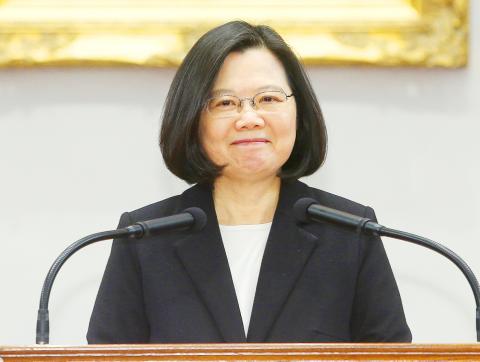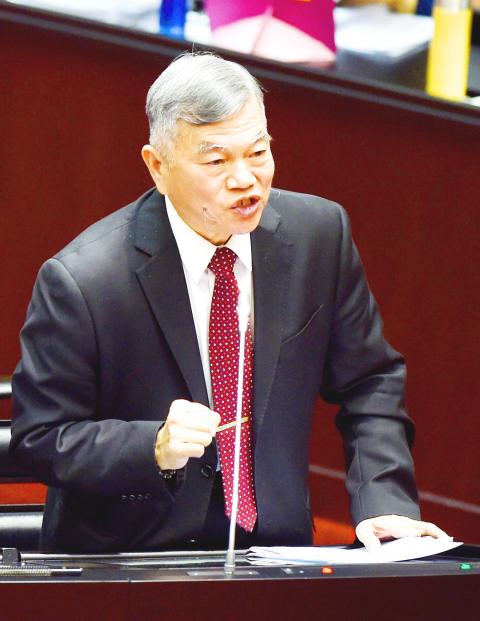President Tsai Ing-wen (蔡英文) yesterday laid out four strategies that she said Taiwanese businesses should adopt to protect their interests in the face of a looming trade war between the US and China.
Speaking to a delegation from the Asia Taiwanese Chambers of Commerce, Tsai addressed a US announcement on Thursday that it would impose tariffs on US$60 billion of Chinese imports, Beijing’s proposed retaliatory tariffs on US$3 billion of US goods and what Taiwan can do to protect itself from the dispute.
First, the nation needs to strengthen its development and production capabilities, Tsai said.

Photo: CNA
This means providing the techniques and added value to creating products considered to be “made in Taiwan,” she added.
The second strategy would be to accelerate domestic investment in renewable energy sources, urban renewal, social housing and elderly care, which are domestic demands that will drive the growth of the nation’s economy, Tsai said.
Third, the president touted the values of innovation and how elevating the nation’s ability to innovate, especially in technology, is the key to trade victory.

Photo: Chien Jung-fong, Taipei Times
To this end, the nation needs to continue to promote its “five plus two” industrial development program and other industrial development projects at a faster rate, Tsai said.
The program covers the Internet of Things, biotechnology, “green” energy, “smart” machinery and the defense industry, as well as creating a new agricultural paradigm and a circular economy.
Finally, Taiwanese businesses should diversify where they conduct trade and manufacture their goods, Tsai said, pointing to the countries targeted by her administration’s New Southbound Policy as potential markets to tap into.
Regarding the possibility of a trade war between the US and China, Tsai told the delegation that Taiwan has a good grasp of the situation and would continue to monitor it and respond as necessary.
Taiwan will continue to engage in negotiations with the US to ensure that its trade interests are not harmed, she said.
She also called on the US and China to hold talks to avoid a full-blown trade war.
Minister of Economic Affairs Shen Jong-chin (沈榮津) yesterday said the Ministry of Economic Affairs has conducted studies and simulations to determine how Taiwan’s economy might be affected by such global developments and stands ready to comply with any orders from the Executive Yuan.
Shen on Thursday told reporters that Taiwanese manufacturers in China and suppliers of components that are assembled there might be negatively affected by the tariffs.

The CIA has a message for Chinese government officials worried about their place in Chinese President Xi Jinping’s (習近平) government: Come work with us. The agency released two Mandarin-language videos on social media on Thursday inviting disgruntled officials to contact the CIA. The recruitment videos posted on YouTube and X racked up more than 5 million views combined in their first day. The outreach comes as CIA Director John Ratcliffe has vowed to boost the agency’s use of intelligence from human sources and its focus on China, which has recently targeted US officials with its own espionage operations. The videos are “aimed at

STEADFAST FRIEND: The bills encourage increased Taiwan-US engagement and address China’s distortion of UN Resolution 2758 to isolate Taiwan internationally The Presidential Office yesterday thanked the US House of Representatives for unanimously passing two Taiwan-related bills highlighting its solid support for Taiwan’s democracy and global participation, and for deepening bilateral relations. One of the bills, the Taiwan Assurance Implementation Act, requires the US Department of State to periodically review its guidelines for engagement with Taiwan, and report to the US Congress on the guidelines and plans to lift self-imposed limitations on US-Taiwan engagement. The other bill is the Taiwan International Solidarity Act, which clarifies that UN Resolution 2758 does not address the issue of the representation of Taiwan or its people in

US Indo-Pacific Commander Admiral Samuel Paparo on Friday expressed concern over the rate at which China is diversifying its military exercises, the Financial Times (FT) reported on Saturday. “The rates of change on the depth and breadth of their exercises is the one non-linear effect that I’ve seen in the last year that wakes me up at night or keeps me up at night,” Paparo was quoted by FT as saying while attending the annual Sedona Forum at the McCain Institute in Arizona. Paparo also expressed concern over the speed with which China was expanding its military. While the US

SHIFT: Taiwan’s better-than-expected first-quarter GDP and signs of weakness in the US have driven global capital back to emerging markets, the central bank head said The central bank yesterday blamed market speculation for the steep rise in the local currency, and urged exporters and financial institutions to stay calm and stop panic sell-offs to avoid hurting their own profitability. The nation’s top monetary policymaker said that it would step in, if necessary, to maintain order and stability in the foreign exchange market. The remarks came as the NT dollar yesterday closed up NT$0.919 to NT$30.145 against the US dollar in Taipei trading, after rising as high as NT$29.59 in intraday trading. The local currency has surged 5.85 percent against the greenback over the past two sessions, central